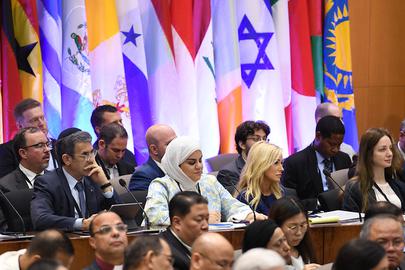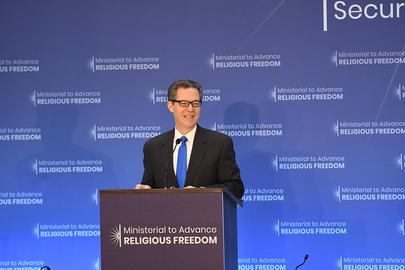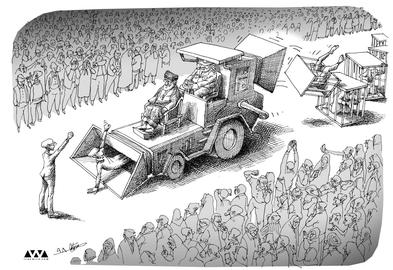This week, the United States State Department will host its second Ministerial to Advance Religious Freedom, aiming to unite faith communites in respect for one another. During a telephone briefing on July 12, Sam Brownback, US Ambassador At Large for International Religious Freedom, told reporters that the administration hopes to “see really a global grassroots movement around religious freedom” emerge from the ministerial process. This year’s conference, which will take place between July 15 and July 18, follows the first ministerial in July of last year.
Brownback emphasized that the initiative’s goal is to unite faiths around the world to “stand for each other,” adding that “every faith that’s a majority somewhere is a minority somewhere else.”
Hate crimes against religious communities, particularly Jewish and Muslim communities, are on the rise in the United States. This increase takes place amid recent instances of white supremacist-linked violence against places of worship in the US and around the world.
Both the shooter at the Tree of Life synagogue in Pittsburgh, who killed 11 in October 2018, and the attacker of the Congregation Chabad community in Poway, California in April of this year expressed white supremacist views. The latter even cited another attack as his inspiration: the March 15, 2019, shootings at two mosques in Christchurch, New Zealand, which claimed more than 50 lives.
Representatives for the communities targeted in Poway and Christchurch will attend this week’s ministerial, joined by a representative of the Christian community targeted in April’s Easter bombings in Sri Lanka.
Extremist rhetoric is a pressing issue for proponents of religious freedom — including the ministerial’s host. The Potomac Plan of Action, which was released by the US following last year’s ministerial, includes a call to states to “[c]ondemn messages or narratives that promote violence against the holders of certain religious or other beliefs or that foster intra- and inter-religious tensions, whether by government officials or non-state actors.”
But contentious issues are likely be raised during the ministerial, including the use of religious freedom arguments to advocate against reproductive and LGBTQ rights — which Knox Thames, the State Department’s special advisor for religious minorities in the Near East and South/Central Asia, has referred to in the past as "difficult questions."
The “difficult questions” are expected to once again be discussed, with multiple survivors of religious persecution set to provide remarks, including Nobel Peace Prize laureate Nadia Murad, a Yezidi woman who survived atrocities committed by ISIS in northern Iraq, and Andrew Brunson, an American pastor who was imprisoned in Turkey for two years before being released in October last year following pressure from the US.
This year’s ministerial promises to be bigger than last year’s, with 115 foreign ministers and multiple delegations invited to join more than 1,000 religious leaders and civil society representatives for discussions in the US capital.
As religious, civil society, and government representatives assemble in Washington, D.C., the hope for the State Department is that meetings will form the foundation of a grassroots movement.
Audrey Williams contributed reporting to this article
visit the accountability section
In this section of Iran Wire, you can contact the officials and launch your campaign for various problems





![Participants at the Ministerial to Advance Religious Freedom at the US Department of State in Washington, D.C. on July 24, 2018 [State Department photo/Public Domain] Participants at the Ministerial to Advance Religious Freedom at the US Department of State in Washington, D.C. on July 24, 2018 [State Department photo/Public Domain]](https://static.prod.iranwire.com/_versions_jpg/filer_public/a8/0c/a80cdf3e-35ad-4567-a8ff-7777d42e6d2b/43584652432_30586e8d8f_z__v516x270__.jpg)





















comments